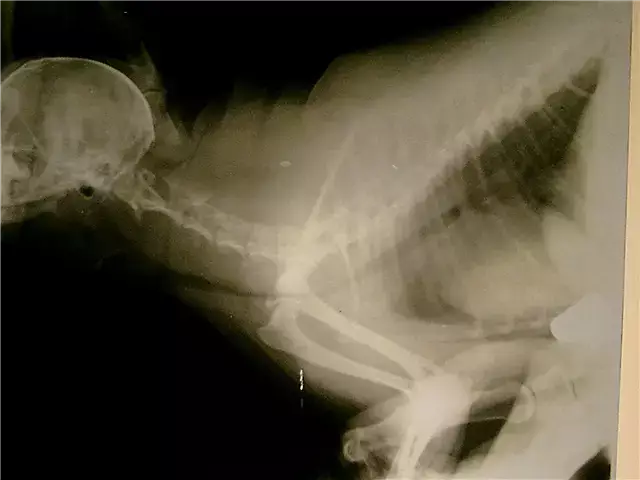- Author Rachel Wainwright wainwright@abchealthonline.com.
- Public 2023-12-15 07:39.
- Last modified 2025-11-02 20:14.
Betaleukin
Instructions for use:
- 1. Release form and composition
- 2. Indications for use
- 3. Contraindications
- 4. Method of application and dosage
- 5. Side effects
- 6. Special instructions
- 7. Drug interactions
- 8. Terms and conditions of storage

Betaleukin is an immunostimulating agent, a stimulant of leukopoiesis, has antiviral activity.
Release form and composition
Dosage form - lyophilisate for preparation of a solution for intravenous (i / v) and subcutaneous (s / c) administration: porous or powdery white mass (1 μg, 0.5 μg or 0.05 μg each in an ampoule, in a blister (cassette) 5 ampoules, in a cardboard box 1 package).
1 ampoule contains:
- active substance: interleukin-1β - 1 μg, 0.5 μg or 0.05 μg;
- auxiliary component: low molecular weight medical polyvinylpyrrolidone.
Indications for use
- immunostimulation of purulent-septic and purulent-destructive processes, chronic septic conditions, infectious diseases, secondary immunodeficiency conditions that developed after extensive surgical operations, severe injuries;
- stimulation of leukopoiesis during radio- and chemotherapy of malignant tumors complicated by toxic leukopenia of II - IV degree, as well as as a protector of leukopoiesis, if chemotherapy is necessary under conditions of leukopenic background (with the content of leukocytes in peripheral blood 3 × 1 billion / l);
- emergency radiation therapy for total and subtotal acute emergency exposure to ionizing radiation (in the absence of additional complications of a thermal nature; if the approximate dose of radiation exceeds 1 Gy);
- newly diagnosed focal pulmonary tuberculosis with a predominance of the productive type of tissue reaction (without and with destruction);
- pulmonary tuberculosis, which for 4-5 months of therapy retains the average size of productive foci and "residual cavities" in the lung tissue, regardless of the initial form of tuberculosis;
- chronic viral hepatitis C, genotype 1 (in the absence of a virological response after primary antiviral therapy with ribavirin and standard or pegylated interferons).
Contraindications
- severe fever, the patient's condition in the stage of septic shock;
- the period of pregnancy and breastfeeding;
- age up to 18 years;
- hypersensitivity to drug components.
In addition, Betaleukin is contraindicated to use for emergency radiotherapy in the following conditions of the patient:
- combined radiation-thermal damage (KRTP);
- fever;
- severe hypotension;
- shock.
Additional contraindications for prescribing the drug in the treatment of tuberculosis:
- hyperthermia and other severe symptoms of intoxication;
- damage to more than three segments, including foci of seeding;
- the presence of cavities of destruction more than 3 cm;
- dominance of exudative tissue reaction in lung tissue.
Method of administration and dosage
Betaleukin is used by intravenous drip or subcutaneous injection.
The infusion solution should be prepared before direct administration. For this, 1 ml of 0.9% sodium chloride solution or water for injection is added to the contents of the ampoule, then the total volume is brought to 100 ml with 0.9% sodium chloride solution. The estimated dose of the drug for infusion is prepared in 500 ml of 0.9% sodium chloride solution or 5% dextrose solution, taking into account the initial dose of the drug in an ampoule and its concentration in 100 ml of the resulting solution.
The drip should be continued for 2-3 hours.
For subcutaneous administration, the contents of the ampoule are dissolved with water for injection or 0.9% sodium chloride solution (0.5-1 ml).
The method of administration of the drug and the dose is prescribed by the doctor based on clinical indications.
Recommended dosage regimen:
- immunostimulation: at the rate of 0.005-0.008 mcg per 1 kg of body weight, the appointment consists of 5 daily subcutaneous or intravenous procedures, after two weeks the treatment can be repeated;
- stimulation of leukopoiesis: at the rate of 0.015-0.02 μg per 1 kg of patient's body weight, one course of treatment is 5 daily subcutaneous or intravenous procedures. If necessary, a second course is shown in the same dose after a two-week break;
- emergency (no later than 2 hours after radiation exposure) radiation therapy: s / c - 1 μg, dissolved in 1 ml of 0.9% sodium chloride solution;
- tuberculosis (as part of combination therapy): 0.005 μg per 1 kg of body weight, course duration - 5 daily subcutaneous or intravenous procedures, duration of intravenous infusion - 3 hours;
- chronic viral hepatitis C, genotype 1 (as part of complex antiviral therapy): s / c, 3 times a week (usually on Monday, Wednesday and Friday), with a body weight of up to 70 kg - 0.25 μg each, with a weight of more than 70 kg - 0.5 mcg each. The duration of one course is 3 weeks. In total, 6 courses are prescribed with interruptions of 6 weeks.
Side effects
- general reactions: in some cases - increased body temperature, headache, chills (after administration of the drug can last for 2-3 hours, then disappear); very rarely - the development of allergic reactions (these undesirable effects are not grounds for canceling therapy);
- local reactions: it is possible - in 4-6 hours after subcutaneous administration, the appearance of redness and mild infiltration at the injection site.
special instructions
In the event of side effects, the patient is shown the use of paracetamol, diphenhydramine, metamizole sodium, including their combinations, for severe forms of allergic reactions, it is possible to prescribe corticosteroids.
Drug interactions
The interaction of Betaleukin with other drugs has not been established.
Terms and conditions of storage
Store at 2-15 ° C. Keep out of the reach of children.
Shelf life is 2 years.
Information about the drug is generalized, provided for informational purposes only and does not replace the official instructions. Self-medication is hazardous to health!






